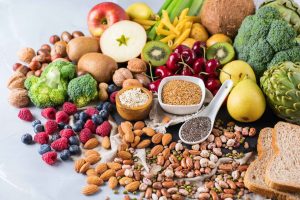
Plant sterols and stanols may play a valuable role in helping you manage cholesterol.
They are natural compounds found in certain plant-based foods that look and behave like cholesterol to your body.
Plant stanols and sterols are similar to cholesterol from a molecular standpoint. They essentially block your body from digesting and absorbing cholesterol because they’ve effectively taken up the available space. Cholesterol is then removed from the body as waste instead of going into arteries to accumulate as plaque.
Some data suggest that when you’re getting enough sterols and stanols in your diet, it can lower total cholesterol by up to 10 percent and “bad” LDL cholesterol by up to 14 percent.
Roughly 2 grams per day of plant sterols and stanols are what’s needed to lower cholesterol. You can get them by eating foods like:
- Fruits
- Vegetables
- Whole grains
- Legumes
- Nuts
- Seeds
- Vegetable oil
All of these foods feature fewer than the 2 grams you’d need to make a dent in cholesterol, and even if you ate a serving of each, you still might not get there every day. But there is a selection of sterol-and stanol-fortified products to help you reach the threshold.
Some common phytosterol-fortified foods include:
- Margarine
- Cheese
- Orange juice
- Milk
- Bread
Just check the labels to look for words like sterol, stanol, or phytosterol.
These foods are generally recommended for anyone who is seeking to lower cholesterol. It’s unknown if they will prevent high cholesterol or reduce the risk of heart disease, but including more plant-based foods into your diet is always a good move for heart health.